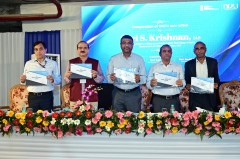- Modern Public School and Aao Sath Chalen bring joy to less privileged section of society at Sangam Park
- Campaigns Zydus Wellness launches ayurvedic drink: Complan Immuno-Gro for immunity
- svarmony Launches Early Access Program for AR-based VPS Navigation System at AWE Europe
- NIXI Unveils New Office and Launches Initiatives to Strengthen India's Digital Ecosystem
- Sumexus Launches Wheelchair-Accessible Grocery Shopping Transport in North Texas
- Open Days were held at the OMODA / JAECOO Vnukovo and JAECOO Vernadsky
- SANY India Secures 1.6 GW Wind Turbine Contracts, Strengthening Position in India’s Wind Energy Sector
- CC Wholesale Clothing Expands Its Collection with Trendy Juniors Clothing and Ladies Plus Size Outerwear Wholesale
- DictaAI Launches to Provide Seamless AI Transcriptions for Every Industry
- Cantabil Expands Nationwide Presence with 13 New Stores
- RPost Named Aragon Research Hot Vendor of the Year in Digital Transaction Management
- Silverdene Luxury Introducing Natural Scalp Hair Serum with Coconut Oil & Spf 30 Extract
- Cisdem AppCrypt for iPhone Released to Lock Apps and Block Websites on iPhone
- Introducing Sunstalker Korea 3-in-1 Water-Based Moisturizer, Serum & Sunscreen SPF 50+++
- Veteran Community Resource & Job Fair Event to Honor and Empower Veterans
 Mail to a Friend Mail to a Friend |
|
     |
CD BioSciences Launches New Solutions for Microautophagy Research
CD BioSciences, a US-based CRO serving the global life science research community, has recently launched a suite of research solutions to support scientists studying of cell death, specifically Microautophagy, including Chemical Screening, Regulator Identification, Mechanism Study, and Phenotype Analysis.
In multicellular organisms, cell death is a critical and active process for maintaining tissue homeostasis and eliminating potentially harmful cells. There are three major morphologically distinct types of cell death, i.e., apoptosis (type I cell death), autophagic cell death (type II), and necrosis (type III). All three types can be executed by different and sometimes overlapping signaling pathways that respond to specific stimuli.
The group of transport systems known as autophagy, which transfers cytoplasmic components to lysosomes (vacuoles), has a variety of functions in physiology and disease. The identified autophagic systems can be divided into three types based on morphological and mechanistic features, i.e., macroautophagy, microautophagy, and chaperone-mediated autophagy.
Microautophagy is a non-selective lysosomal degradation process that was first identified in 1966 and has been studied mainly in yeast. It involves direct phagocytosis of cytoplasmic cargo by autophagic tubules at the plasma membrane that mediate both invagination and lysis of vesicles into the lumen. Due to its constitutive nature, microautophagy of soluble substrates can be induced by nitrogen starvation or rapamycin via regulatory signaling complex pathways. Moreover, microautophagy maintains organelle size, membrane homeostasis, and cell survival under nitrogen limitation.
In addition, microautophagy coordinates with and complements macroautophagy, chaperone-mediated autophagy, and other autophagic pathways. Three forms of selective microautophagy, including micropexophagy, sporadic nuclear microautophagy, and micromitophagy, share some commonalities with microautophagy. The precise mechanisms of microautophagy are becoming increasingly important as experimental data accumulate.
Autophagy has been implicated in physiological and pathological processes such as development, cell differentiation, infection and cancer. As a trusted CRO, CD BioSciences now offers clients worldwide a variety of solutions covering all aspects of life science research, including microautophagy, ranging from Chemical Screening, Regulator Identification, Mechanism Study, Phenotype Analysis to Animal Model Generation.
For example, the Chemical Screening solutions allow researchers to screen for inhibitors or activators of specific types of cell death. Regulator Identification helps identify gene regulators involved in specific cell death pathways. Mechanism Study investigates the regulatory mechanisms of specific regulators. Phenotype Analysis analyzes cell phenotypes regulated by genes/proteins of interest, while Animal Model Generation creates genetically engineered animal models for use in research.
CD Biosciences is committed to meeting all the needs of researchers in signaling pathway research and will support customers' innovative discoveries by providing high quality reagents and comprehensive solutions. For customers interested in more information regarding cell death solutions or other signaling pathways, please visit CD BioSciences at https://www.cd-biosciences.com/.
About CD BioSciences
CD BioSciences is a trusted research product supplier and CRO based in New York. With high-quality reagents and comprehensive services, CD BioSciences is a one-stop shop devoted to advancing signaling pathway studies for researchers. The company is committed to fulfilling all demands in the research of signaling pathways and provides high-quality reagents and comprehensive solutions to support innovative discoveries.
Company :-CD BioSciences
User :- Michelle Moser
Email :-info@cd-biosciences.net
Url :- https://www.cd-biosciences.com/






_thumb.jpg)




